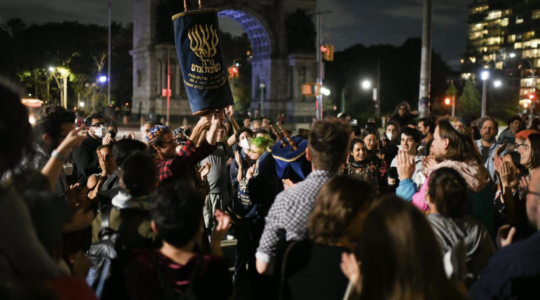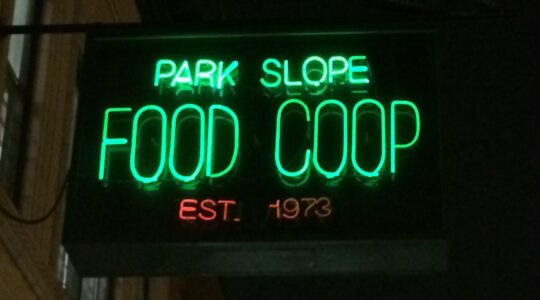Tuesday’s high-profile presidential forum held by the Republican Jewish Coalition (RJC) with five of the party’s leading candidates may shake up a nomination contest in which many Jewish big givers remain on the sidelines, waiting for a clear frontrunner to emerge — a problem for a party that suddenly finds itself playing financial catch-up with the Democrats.
A strong supporter of former New York Mayor Rudolph Giuliani called the event a “turning point” for his candidate.
“Something clicked today as they saw Rudy talking passionately about his support for Israel and the Jewish community,” said the source. “And just as passionately about how he can energize RJC members and other Republican activists by running a 50-state presidential campaign that challenges Democrats in traditionally blue and purple states
with large Jewish populations.”
The former New York mayor received an enthusiastic introduction from Las Vegas businessman and GOP mega-giver Sheldon Adelson, one of the most prominent party donors who has not committed to a particular candidate.
But other leading Jewish Republicans say many of their colleagues continue to hold back, despite what seems like a Giuliani surge.
“I still haven’t seen a lot of movement,” said Texas businessman Fred Zeidman, who is supporting Sen. John McCain (R-Ariz.), another of Tuesday’s speakers. “I see a lot of people waiting for there to be a single candidate to rally around.”
In many ways the forum echoed a similar event earlier in the year sponsored by the National Jewish Democratic Council (NJDC) for that party’s presidential hopefuls. The overwhelming emphasis was on uncritical support for Israel and promises to thwart Iran’s nuclear ambitions.
Iran is “assisting terrorists who are killing American troops,” said Giuliani, who scored the most applause lines of the day. “We’ve seen what Iran will do with ordinary weapons. If I am president of the United States, we will never find out what they would do with nuclear weapons because they would never get nuclear weapons.”
He warned against Democratic attempts to limit presidential authority to strike Iran.
“If America is clear that we will exercise the military option, the chances that we will have to do it will decline," he said.
Former Sen. Fred Thompson stressed the fact that Israel and the United States face common adversaries in Syria and Iran.
“They say America is the ‘Great Satan’ and Israel is the ‘Little Satan’ and both must be destroyed,” he said. “The United States must make it clear we will not allow Iran to be a nuclear threat.”
Support the New York Jewish Week
Our nonprofit newsroom depends on readers like you. Make a donation now to support independent Jewish journalism in New York.
Former Massachusetts Gov. Mitt Romney rejected the use of ground forces in Iran, but said he would consider “blockade, bombardment and surgical military strikes.”
While the Democratic contenders are avoiding the politically risky issue of Israeli-Palestinian negotiations, several GOP candidates waded into the fray with guns blazing, strongly repudiating the policies of the Bush administration.
Romney criticized next month’s scheduled Annapolis summit on the Israeli-Palestinian conflict, now the centerpiece of administration Middle East policy.
"How could you possibly have a peace conference at this stage? Who would you talk to?” he said.
McCain castigated the administration decision to press for Palestinian elections that included Hamas.
“We decided elections would be a good thing for Gaza,” he said. “We held elections, and you know who is in charge there now.”
Sen. Sam Brownback (R-Kans.), who ventured the furthest into the realm of domestic issues during the forum, referred to his recent endorsement of a controversial plan by Knesset member Benny Elon that would repudiate the Palestinian Authority, recognize Jordan as the only legitimate representative of the Palestinian Authority and maintain Israeli control over the West Bank.
In the past Elon has also called for “transferring” Arabs from the West Bank to Jordan.
The time has come, the senator said, to “look at different proposals.”
Most of the candidates took swipes at Democratic frontrunner Hillary Clinton and her closest rival, Sen. Barack Obama (D-Ill.)
Giuliani used his 1995 diplomatic slap at Palestinian leader Yasser Arafat to poke his possible rival in a possible “subway series” presidential election
As mayor, he said, “I had him thrown out of the United Nations concert at Lincoln Center…. the truth is I was informed that he was there and I had to go out and give a curtain speech. I didn’t hesitate, like Hillary Clinton hesitates to answer questions on what she’s going to do about Iran. I didn’t seek to negotiate with him, like Barack Obama would do or says he’d do with these people. I didn’t call for a team of lawyers to help me. I just made a decision. See, I lead. That’s what being a leader is about. A leader has the confidence to make a decision.”
Support the New York Jewish Week
Our nonprofit newsroom depends on readers like you. Make a donation now to support independent Jewish journalism in New York.
He also touted his rejection of a $10 million check from Prince Al-Waleed of Saudi Arabia for Sept. 11-related charities as an example of his leadership.
Not to be outdone, Romney told the group how he ordered Massachusetts state agencies not to provide support for former Iranian president Mohammad Khatami’s visit to Harvard in 2006 – including help with security.
Two candidates differed sharply on the issue of U.S. detainees in the war on terrorism.
Romney castigated the Democratic frontrunners for voting against legislation legalizing interrogation techniques that critics have said are tantamount to torture. But McCain, a former prisoner of war in North Vietnam, came out strongly against torture.
“If I become president, the first thing I will do is announce that we will not torture people,” he said.
Top military leaders, fearful that the same techniques will be used against American POWs, are strongly against the mistreatment of prisoners, he said: “only those who have never served in the military support torture.”
Romney touched on some of the sensitive religious issues that have dogged his campaign. Asked if his Mormon faith would hurt him with evangelical voters, he said “I believe evangelical Christians are very much open to my candidacy because we share views on so many issues.”
But he also may have displayed a degree of unfamiliarity with the Jewish audience when he alluded to implied support from Focus on the Family president James Dobson, who has spurned Giuliani and Thompson.
“Well, that sort of left one guy standing there,” Romney said.
Thompson, in his inaugural foray before a Jewish audience, was hit with a question that most politicians dread: what is his position on convicted spy Jonathan Pollard?
“He got his trial, he got his due process, and as far as I’m concern he’ll finish his prison sentence,” Thompson said.




